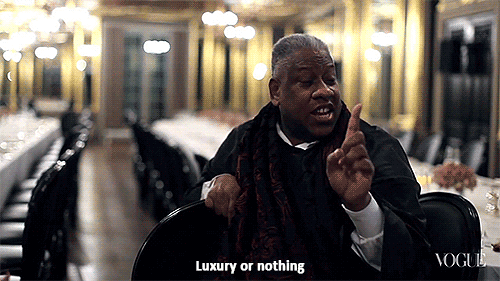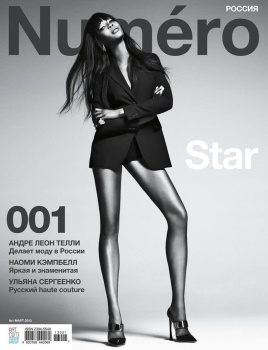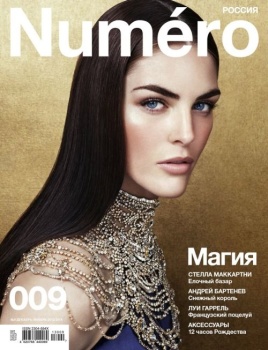André Leon Talley Says His Memoir Is Not About Anna Wintour
Talley has detailed the ageism and racism that he faced during his decades-long career in fashion.
By
Rosemary Feitelberg and
Kathryn Hopkins on April 24, 2020
André Leon Talley’s new
book won’t be out until September, but many are already feasting on the fallout he had with his former
Vogue boss
Anna Wintour.
Penguin Random House has pushed back the release of “The Chiffon Trenches: A Memoir” to September. But The Daily Mail’s recent recap of the
book exposed how the two high-powered friends and ex-colleagues have fallen out. In an interview Friday, Talley,
Vogue’s former creative director, detailed his side of the back story, and emphasized how his upcoming tome centers on his career in fashion journalism, not just his years of Wintour.
Talley said, “I do not consider this to be a vengeful, bitchy tell-all. When the galleys were finalized and printed, the first person I gave the galley to was
Anna Wintour. I sent her an e-mail saying, ‘if there is anything that you see in the galley that you would like to be removed, please tell me and I will be happy to do so.’”
Talley said that he and Wintour “had a conversation” and she asked that passages about her daughter Bee Shaffer’s wedding and a few other private references be removed. “This is not a vengeful book about Vogue and Anna Wintour. There are parts in the book where I say that some of the best years of my life were at Vogue. And the career beginning in 1983, basically I owe it to Anna Wintour.”
That said, he added, “From a humanitarian perspective, she left me with psychological scars. I was often left blowing in the wind without any explanation, which I think perhaps she should have given me.”
As for what Wintour might find most hurtful, Talley said, “If I had said to her, she’s vain. She’s not vain. But she’s very occupied with her looks. I don’t know. I didn’t write the story, thinking, ‘How can I hurt Anna Wintour?’ That was not my intention. My intention was to do a story about me, an African-American man, coming from very humble beginnings, who came up to New York, went to Brown University on scholarship, got a job with Andy Warhol, went through the highest ranks of fashion through Women’s Wear Daily [under] John Fairchild, Diana Vreeland [at a volunteer at The Met’s Costume Institute], Vogue.”
A source close to Wintour told WWD that she had asked for certain references to be removed from the book because they involved members of her family, who didn’t choose to have aspects of their lives made public. They added that Wintour considered Talley a friend for more than three decades and was saddened by the way he chose to portray many aspects of their friendship, but he is entitled to tell it as he remembers it and she wishes him the best.
Interestingly, Talley is still listed as a contributing editor on Vogue’s masthead, alongside the likes of Grace Coddington, Lisa Love and Lauren Santo Domingo.
Response to the 2017 documentary, “The Gospel According to André,” is what gave Talley the confidence to write the book. “I felt it was very important for future generations as well as the generation of today to tell the story in an honest way and in a compelling way,” he said. “Although the things (in the book) that have been picked up by The Daily Mail are objectively true and factual, any powerful person, be it a man or a woman, they have many sides. They have extraordinary sides. Anna Wintour is a brilliant editor. She is a powerful woman, I do not take that away from her. At the same time there are sides that do not rise up to the standards.”
As close as Talley and Wintour were, “the relationship has eroded into nothing” and Talley said he is “very hurt by that.” From his view, the doors for communication were shut down by Wintour after she read the galley in January. Any e-mails sent to the Condé Nast leader are answered by a third party. “I wish her well. This book is not there to say, ‘This is how I feel about Anna Wintour — she’s cruel and mean.’ I just feel that Anna Wintour mishandled our relationship and perhaps it was a lack of communication on my part as well as hers.”
Ageism and his appearance were other factors in his departure, said Talley, who has struggled with his weight. After he was pulled from hosting live chats on the red carpet at the Met Gala in 2018, his absence was noticed by Jennifer Lopez’ agent, he said. “They replaced me. Yes, things can change but the way that it was handled hurt me. That’s what I felt had to be told. Very often the Condé Nast protocol is brutal — absolutely brutal and cruel. And the fish head rots from the top, OK?”
Talley continued, “As soon as they fired Diana Vreeland, they had to lock the door. They did not want to tell her that she was fired. They just told her she had to go. Then she came to work, the door was locked and they changed the office from red to beige. They’re cruel. It’s a cruel world. I guess it’s no more cruel than any other world, but it’s not a humane world. It is not a world of kindness.”
While many imagine what it might be like to be on the inside at Vogue, Talley said, “It’s very hypocritical. It has the veneer of being very polite, courteous, well-groomed and polished. When you are in the halls of Vogue, there is a certain standard of politeness, education, kindness, just human correctness. But that doesn’t go to the core of people. People are treated and mishandled terribly at Condé Nast and it starts at the top.”
Talley described Wintour as a woman of very few words, and “sphinx-like silence.” He dismissed the suggestion that the environment he portrayed is indicative of corporate America. “No, I think the world of Vogue is a unique culture. I think the world of publishing is unique. I have worked at other places like Women’s Wear Daily, and I worked with Andy Warhol. I never had that kind of experience…It’s a culture that was engrained in the issue. This is the way things were handled. Decisions were made for you — good or bad. You just had to go with them without any explanation — the benefit of a discussion or debate.”
The former Condé Nast-er acknowledged that he does not consider himself to be a perfect person. “To put up with me at Vogue, at Women’s Wear Daily, I’m sure was not an easy thing. I take total responsibility, too. But I’m not going to be a victim of Anna Wintour. I am not sitting here crying, saying, ‘Woe is me. Anna Wintour has ditched me and pushed me to the curb,’ which I feel she has done. But I’m strong enough to overcome that.”
Having been awarded a Dame Commander of the British Empire by Queen Elizabeth and the Legion of Honor by France’s former president Nicolas Sarkozy, Wintour remains British to the core, according to Talley. “Maybe it is the British culture. She never knew how to say to me, ‘André, I need you.’”
Reminded that some people are just not that way, Talley agreed, adding, “I accept that because they are not my boss. She gave me the highest accolade I could have — creative director of Vogue, a black man named the creative director of Vogue. But she did not show me unconditional love that other bosses had — Andy Warhol, Diana Vreeland. There are people who love me for who I am. I have all the faults. I am overweight. People do look at me and say I love you. People respect me. I am not the only overweight person in the world, but maybe to her it was repulsive. I don’t know. She never said that to me. I’m not trying to put words in her mouth.”
Had the tables been turned and Wintour had written a book, Talley said he would not have reacted as Wintour has. “Yes, I would have been upset if I were in her shoes. I would be hurt. But I would call out to say, ‘Why did you do this or what did I do wrong?’ I would have apologized I didn’t know that I behaved…I would have tried to reach some sort of resolution.”
Talley’s career included runs at WWD, Vanity Fair, House & Garden and Vogue. The book also addresses some of the racism he faced along the way. In the mid-Seventies, he was told that Clara Saint, the former public relations officer of Rive Gauche at Yves Saint Laurent, was calling him “Queen Kong, which was the most racist thing that I could think of,” he said.
Talley and Wintour once had “a very deeply close personal relationship,” but it’s been radio silence since January. Talley said he sent her an e-mail of support after learning her son Charlie Shaffer had COVID-19. Talley said, “Not a word. Not an e-mail at all. But this is the way she is. She simply has become insulated in her own power. Perhaps she thinks that people like me who are really loyal friends, or were loyal friends — I can’t say that now we are friends because she doesn’t even speak to me in public — the last time I saw her in public, I said hello to her and she turned her back on me. I guess she was upset.”
Despite this great divide, Talley reiterated what he wrote in the book — that should he ever be sick in the hospital, “God forbid, I would hope that she would come to say thank you. I am a forgiving person and I believe in God. My life is structured on my faith. I believe in forgiveness. I do not hold any grudges.”
Acknowledging how Wintour has done a lot for the fashion industry and continues to do so, Talley cited her championing A Common Thread, raising money for the Metropolitan Museum of Art, “great philanthropic work” and supporting fashion through her tenure at Vogue. “This is her greatness,” he said.
Referring to their closer days, Talley said, “As a person who knew her closely and escorted her to her mother’s funeral in London during a blizzard and as a person who hugged her after eulogizing her mother and walked her to the car as she was having an emotional breakdown due to the death of her mother, this is a friend. I went with her on the plane to Paris and the next morning we were at the Givenchy appointment during couture,” adding that Wintour’s husband and children were unable to fly due to the blizzard. “I have gone through many significant family moments with Anna Wintour. I was at her wedding and I was the only person invited from Vogue except her two assistants.”
As for the adage that business is never personal, Talley said, “No, no, sorry not buying it. Business, unless you are a robot or an algorithm, if you’re a human being, it’s got to be personal. If you’ve got any sense of humanity — no matter how high you go corporate — it’s got to be personal. Part of the magic of the Vogue culture was that it was very personal,” he said.
He and his colleagues would attend funerals for family members of staffers, together even ones that were held in the middle of the workday. “We didn’t take these things for granted.” Talley said. “If it was business as usual, she wouldn’t have paid for the intervention and the Duke Diet and Fitness Center [for him]. That was all paid for by Condé Nast. Don’t tell me that was corporate. She was concerned, maybe trying to save me. Because she probably considered me a talent then. When I got to be 70 with this weight problem, she thought of me in a different light. She may have cared, but she saw me in a different light. And yes, there was ageism.”
Above all, the book is meant to show readers how Talley survived in “this rarified atmosphere and culture of publishing of fashion in Vogue magazine.” he said. “Through a career in fashion journalism, I hope that it will impart to future generations that you can survive as long as you are strong and that you believe in yourself. It is my goal that when I am gone of this earth, people will go to the library, pick up the book and be inspired by it.”
WWD


 .
.

